
Related
The U.S. yesterday lashed out at Spain’s decision to pull its 1,400 troops out of Iraq within the next 15 days. Spain’s new Prime Minister Jose Luis Rodriquez Zapatero had originally said he would only pull the troops out on July 1 if there wasn’t a new UN resolution [includes rush transcript]
But after the recent Iraqi uprising Zapatero said the move must take place as soon as possible.
Referring to Spain’s decision, White House spokesman, Scott McClellan, told reporters that President Bush had stressed the importance of not giving “false comfort to terrorists or enemies of freedom in Iraq”. Democratic presidential candidate John Kerry also said Sunday he regretted Zapatero’s decision.
Meanwhile, European Commission President Romano Prodi praised the move and suggested that other nations were likely to follow saying “With this decision, Spain has fallen into line with our position. The divide that prevented Europe from having a common position is being overcome.”
Spain’s troops are stationed now outside Najaf, the Shiite Holy City where the US has threatened to invade in order to kill cleric Muqtada al Sadr. On Friday, Sadr warned that his followers would wage a general war against the US if it decided to invade Najaf.
According to the Madrid newspaper El Pais, Zapatero speeded up his decision after his new Defense Minister Jose Bono returned from an unpublicized trip to Washington two weeks ago with a gloomy report on the prospects of the United Nations stepping in by the summer.
Spain’s decision to pull out of Iraq marks the formal break-up of the alliance known as the Azores Trio named after the meeting between Bush, British Prime Minister Tony Blair and then-Spanish Prime Minister Jose Maria Aznar where the date for the invasion of Baghdad was decided.
- Jordi Ortega, independent journalist and filmmaker from Barcelona, Spain. He has worked for Television Espanola, public television in Spain, Telemundo, as well as the Fuji News Network. He also writes for the LA Weekly. He is currently based in Los Angeles where he is on the board of the LA Press Club.
Transcript
AMY GOODMAN: We turn to Jordi Ortega, a filmmaker from Barcelona, Spain. He has worked for public television in Spain and others and writes for the L.A. Weekly. He is based in Los Angeles where he’s on the board of the L.A. Press club. We welcome to Democracy Now!.
JORDI ORTEGA: Thank you for inviting me. I’m very happy to be here.
AMY GOODMAN: Can you talk about Zapatero’s decision? Did it surprise you?
JORDI ORTEGA: It didn’t surprise me at all… The official way that it was said (by the USA), as you were saying before, they said that it was “an abrupt reaction that gives false comfort to terrorists and it may put at risk other coalition forces…” I think he said it from the very beginning, it was in his political campaign, that he wanted to do what the people wanted. I think it’s not a technical difference that he is having with the position of the United States. I think it’s a very essential thing. They are against the war like many people in Spain, and that’s basically what I think he is doing, being coherent to what most of the people think there and what he thinks. And that’s basically what I think.
AMY GOODMAN: Can you talk about what happened in Spain, the bombing and the whole fall of the Aznar government?
JORDI ORTEGA: I have to say that I wasn’t there when this happened. Most of my people are in Barcelona, but I have a very good friend who is a biologist, and she told me in a moving e-mail, she used to take that train for four years for her studies in university, and what happened there, everybody saw it on TV, was just horrible. I think that the last number was 191 civilians who died in this horrible — that horrible morning that happened there. It was just a massacre. It was the biggest terrorist attack in Spain since, I think, 1981, when there was a terrorist attack in Barcelona against civilians at the Hypercor supermarket in Barcelona. And so, we had never seen anything like this since then. The kind of terrorism that we have been seeing was more the gun against some politicians that ETA used to do.
AMY GOODMAN: Of course, it was immediately assumed it was ETA.
JORDI ORTEGA: Yes. I think that was such a manipulation of the intelligence that we were having because it was said very fast it was ETA. Despite ETA saying that it wasn’t them, and they said it officially through the sources that they do this, which is through some media there in the Basc Country, and despite I think it was a member of the parliament who was saying “it wasn’t ETA, we kind of thing that it was Al Qaeda.” And despite Al Qaeda saying it was them, through I think it was a television station in France, I don’t remember right now. I can remember the most important newspaper in Spain, El Pais, putting in their online edition in the title that it was ETA, ETA strikes Madrid, so, it was kind of negative.
AMY GOODMAN: Jordi Ortega, you bridge two worlds. You come from Spain, but you are living here in Los Angeles. So, you get to see both the coverage in both countries. What do you think of the u.s. Coverage of what’s going on in Iraq right now as well as — as well as the coverage of your own country, and the decision by your prime minister to pull the troops out immediately from Iraq.
JORDI ORTEGA: About journalism, I will tell you really fast. When I first moved to Los Angeles, I thought — I saw that there, like, 15 local TV stations or so, I thought wow, they must have this city or this country very well covered. But soon I realized it wasn’t the case. It’s usually the same opinion, the same point of view. And with the networks it’s the same, it’s very difficult to find differences among them and that’s really, really difficult to understand for me coming from Europe where every channel is very — if you want politically targeting a different point of view. And regarding Zapatero’s decision, as I was saying a little bit before, I don’t think it’s anything new. It’s something essential of his standpoint, and I wanted to say also first of all that it’s coherent, I think politically, and then it’s understandable context-wise after what happened. I mean 191 civilians in Spain have died and as you know, we have there only 1.300 troops. So if you see the proportionality of that, it’s really horrible. How many American soldiers are there, 130,000? How many American soldiers have died in Iraq? About 700. I think Spanish — Spain has suffered a lot — we have suffered a lot. That, to begin with. The people of Spain and Spain. And then, this decision, we have to realize that it’s not a decision of leaving the United States alone there. Not at all. It’s just a decision of bringing the troops home, but Spain will continue to support. The Spanish support is very valuable, I believe, why? Because, think that we had 40 years of dictatorship of the level of Hitler and Mussolini there, and in 30 years, Spain was able to get in the European Union, be a democracy and be one of the fastest growing countries in Europe in terms of innovation and in terms of economical growth. Secondly, we also are a county that has embraced. We are half Muslims, if you want. We had Islam in Spain for many centuries. And it has left us, you know, an incredible legacy in our language and architecture and culture.
AMY GOODMAN: Jordi Ortega, I want to thank you very much for being with us, an independent journalist and filmmaker from Barcelona, Spain, based here Los Angeles on the board of the L.A. Press club.

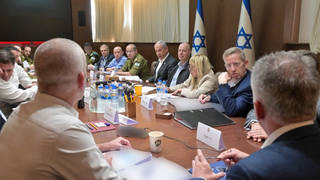

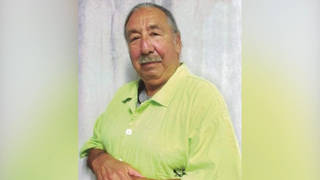
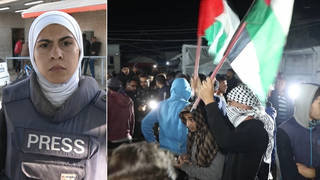





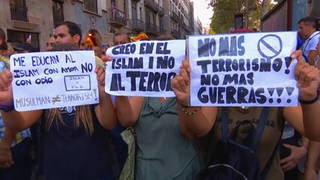
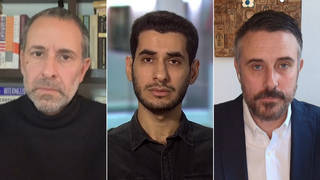
Media Options